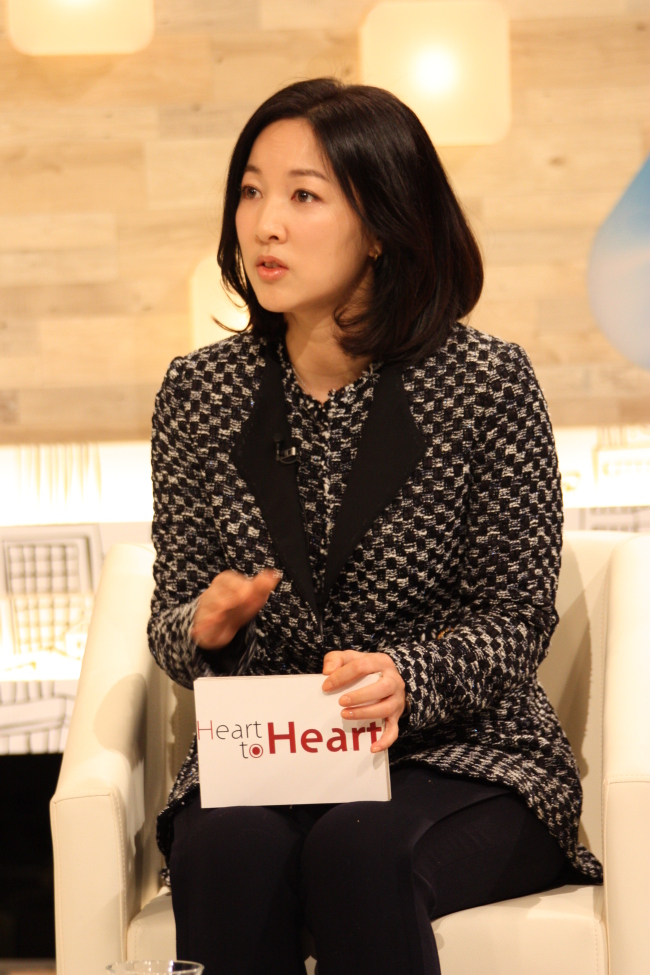[Eye on English] ‘Presentation skills depend on practice’
Theresa Rah shares secrets of effective English presentations
Theresa Rah, a popular speaker, TV presenter and English consultant, is perhaps best known for presenting PyeongChang’s final bid for the 2018 Winter Olympics.
Her strong, eloquent speech in 2011 in Durban, South Africa, is seen as having played a key role in swaying the IOC voters. Not only that, but it thrilled millions of TV viewers in Korea.
The video clip of her presentation became a viral hit, adding to the “English-fever” here. It also earned her the nickname “The Heroine of Durban.’’
Yet, Rah admitted she was afraid of speaking in public until her university years.
“I had a small voice. When I spoke, people would always have to ask me to say it two or three times, because they couldn’t hear me,” she told The Korea Herald.
Rah, also known by her Korean name Seung-yun, joined a public speaking club at her university. After some practice, she found she was no longer nervous of speaking in front of an audience.
The former communication director of PyeongChang’s 2018 bid committee still believes more than anything that practice can improve communication and presentation skills.
 |
|
Theresa Rah, former communication director of the PyeongChang 2018 bid committee, currently works as an English consultant and presenter with Arirang TV. (Arirang TV) |
“My PyeongChang presentation wasn’t created like that overnight. It took a year and a half, eight other presentations and countless hours of rehearsals,” she said.
“So I would say practice more than anything,” Rah said emphatically.
She also said it was important to be able to deliver the message to the audience.
“Many Koreans are not comfortable about showing their emotions. With presentation, it requires some emotion to be truly effective.”
Visual effects are another aspect of communication that Koreans are uncertain about, she said.
Rah recalled when she was a judge for a presentation competition for university students.
“The kids on (almost) all the teams were donned in black suits, regardless of their topic,” she said.
But one team wore red hoodies in keeping with their theme of blood donation, which made an impact.
Enunciation and emulation
As Korea becomes more connected to the rest of the world, being able to speak English fluently will be advantageous, but is not a requirement for all, since most people around the world are not native English speakers, Rah pointed out.
More important than pronunciation, according to Rah, is being able to speak clearly and slowly.
“Pronunciation does not matter so much, but enunciation does,” she said
“Just make it sure that you open your mouth enough, and move your lips and tongue enough to speak clearly.”
“I think that’s a bigger problem than correcting pronouncing the R’s and the L’s that so many Korean speakers find difficult.”
Rah added that reading out loud was the one of the best ways to practice English speaking. She said she developed the habit of reading aloud when she was in fifth grade.
“Because my father was going back and forth between Korea and other countries, I would spend about two years in Korea, then go abroad, then back. Often, I would forget my English during my stay here.”
“I had a teacher who had an amazing voice and she would read books to us. So I tried to imitate her at home. That helped me to recover my English,” she recalled.
Emulation, she said, in fact is a technique she often advises for students who want to improve their English speaking skills.
“Pick a speaker whose style that you like. There are so many materials out on Internet right now, you can get transcripts, and just imitate their voices ― how they say it, the way they go up and down.”
“By imitating that you can improve your own speaking style, and incorporate it into your presentations,” she added.
Following her diplomat father, Rah spend most of her youth abroad in countries such as Canada, Denmark and the U.K. She began a career at Arirang TV, an English-language television channel based in Seoul in 1996 as a reporter, anchor and host.
She left the company to pursue a career as a communication specialist and worked for several organizations, including the 2002 World Cup organizing committee and the PyeongChang bid committee. She also set up her own English consulting firm, Oratio, in 2003.
The former TV presenter came back to Arirang TV studio two years ago, where she now hosts the channel’s longest-running and most popular talk show, “Heart to Heart.”
It is her first TV show in seven years, and she is keen to make up for lost time.
Rah said the experience she gained from PyeongChang helped her to be a TV host.
“I think if they offered me the job five or 10 years ago, I would not able to do it,” she said.
“When I first started at Arirang, I was a little bit too focused on how I look, what kind of questions I should ask, whether my English was perfect or not.
“But I now realized that become a better interviewer you really need to focus on guests, not be focused on yourself, and I’m still learning every time I go on stage.”
Rah still runs her communication consulting firm. As a consultant, Rah advises against using difficult words and long sentences in presentations.
“Writing presentations simply is always best, and then practice and practice,” Rah added.
By Oh Kyu-wook (596story@heraldcorp.com)
|